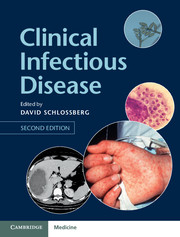Book contents
- Frontmatter
- Dedication
- Contents
- List of Contributors
- Preface
- Part I Clinical syndromes: general
- Part II Clinical syndromes: head and neck
- Part III Clinical syndromes: eye
- Part IV Clinical syndromes: skin and lymph nodes
- Part V Clinical syndromes: respiratory tract
- Part VI Clinical syndromes: heart and blood vessels
- Part VII Clinical syndromes: gastrointestinal tract, liver, and abdomen
- Part VIII Clinical syndromes: genitourinary tract
- Part IX Clinical syndromes: musculoskeletal system
- Part X Clinical syndromes: neurologic system
- Part XI The susceptible host
- Part XII HIV
- 98 HIV infection: initial evaluation and monitoring
- 99 HIV infection: antiretroviral therapy
- 100 Immune reconstitution inflammatory syndrome (IRIS)
- 101 Differential diagnosis and management of HIV-associated opportunistic infections
- 102 Prophylaxis of opportunistic infections in HIV disease
- Part XIII Nosocomial infection
- Part XIV Infections related to surgery and trauma
- Part XV Prevention of infection
- Part XVI Travel and recreation
- Part XVII Bioterrorism
- Part XVIII Specific organisms: bacteria
- Part XIX Specific organisms: spirochetes
- Part XX Specific organisms: Mycoplasma and Chlamydia
- Part XXI Specific organisms: Rickettsia, Ehrlichia, and Anaplasma
- Part XXII Specific organisms: fungi
- Part XXIII Specific organisms: viruses
- Part XXIV Specific organisms: parasites
- Part XXV Antimicrobial therapy: general considerations
- Index
- References
98 - HIV infection: initial evaluation and monitoring
from Part XII - HIV
Published online by Cambridge University Press: 05 April 2015
- Frontmatter
- Dedication
- Contents
- List of Contributors
- Preface
- Part I Clinical syndromes: general
- Part II Clinical syndromes: head and neck
- Part III Clinical syndromes: eye
- Part IV Clinical syndromes: skin and lymph nodes
- Part V Clinical syndromes: respiratory tract
- Part VI Clinical syndromes: heart and blood vessels
- Part VII Clinical syndromes: gastrointestinal tract, liver, and abdomen
- Part VIII Clinical syndromes: genitourinary tract
- Part IX Clinical syndromes: musculoskeletal system
- Part X Clinical syndromes: neurologic system
- Part XI The susceptible host
- Part XII HIV
- 98 HIV infection: initial evaluation and monitoring
- 99 HIV infection: antiretroviral therapy
- 100 Immune reconstitution inflammatory syndrome (IRIS)
- 101 Differential diagnosis and management of HIV-associated opportunistic infections
- 102 Prophylaxis of opportunistic infections in HIV disease
- Part XIII Nosocomial infection
- Part XIV Infections related to surgery and trauma
- Part XV Prevention of infection
- Part XVI Travel and recreation
- Part XVII Bioterrorism
- Part XVIII Specific organisms: bacteria
- Part XIX Specific organisms: spirochetes
- Part XX Specific organisms: Mycoplasma and Chlamydia
- Part XXI Specific organisms: Rickettsia, Ehrlichia, and Anaplasma
- Part XXII Specific organisms: fungi
- Part XXIII Specific organisms: viruses
- Part XXIV Specific organisms: parasites
- Part XXV Antimicrobial therapy: general considerations
- Index
- References
Summary
Infection with human immunodeficiency virus (HIV) can be devastating news to newly diagnosed patients. Early recognition of the infection, monitoring of the immune deficiency both clinically and quantitatively, prophylaxis and treatment of opportunistic infections, and starting antiretroviral treatment have made such infection a chronic disease with documented increase in survival rate. More than 34 million people worldwide, and more than one million in the United States are living with HIV infection. Primary care physicians need to be familiar with the history, clinical presentation, complications, early detection, and treatment of HIV infection, especially during the early stages of the infection, when they are expected to care for these patients. US Preventive Services Task Force (USPSTF) made a Grade A recommendation to screen all patients (18 to 65 years) for HIV. If implemented, primary care physicians will care for a growing population of newly identified relatively asymptomatic HIV patients, and they will need to adhere to the latest recommendations for early treatment and prevention of transmission.
HIV clinical presentation
Patients can present with different complaints ranging from an acute nonspecific retroviral syndrome (mononucleosis like) lasting 1 to 4 weeks after HIV-1/HIV-2 acquisition with an incubation period as long as 6 weeks, to an AIDS-defining illness suggesting advanced immunosuppression, most commonly Pneumocystis jirovecii (carinii) pneumonia, esophageal candidiasis, wasting syndrome, or Kaposis's sarcoma. During this initial presentation, it is important for clinicians to establish the route and risks for acquisition of HIV with open, nonjudgmental questions because this is essential for potentially reducing further transmission and recognizing complications.
- Type
- Chapter
- Information
- Clinical Infectious Disease , pp. 638 - 644Publisher: Cambridge University PressPrint publication year: 2015



